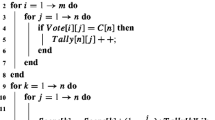Abstract
Metasearch engines are developed to overcome the shortcoming of single search engine and try to benefit from cooperative decision by combining the results of multiple independent search engines that make use of different models and configurations. In this work, we study the metasearch problem via voting that facilities multiple agents making cooperative decision. We can deem the source search engines as voters and all ranked documents as candidates, then metaseach problem is actually to find a voting algorithm to obtain group’s preferences on these documents(candidates). In addition to two widely discussed classical voting rules: Borda and Condorcet, we study another two voting algorithms, Black and Kemeny. Since Kemeny ranking problem is NP-hard, a new heuristic algorithm has been proposed for metasearch. Some experiments have been carried out on TREC2001 data for evaluating these metasearch algorithms coming from voting.
Access this chapter
Tax calculation will be finalised at checkout
Purchases are for personal use only
Preview
Unable to display preview. Download preview PDF.
Similar content being viewed by others
References
Aslam, J.A.: Mark H. Montague, Models for Metasearch. SIGIR (2001)
Black, D.: The Theory of Committees and Elections. Cambridge University Press, Cambridge (1958)
Borda, J.C.: Mémoire sur les élections au scrutin. Memoires des l’Académie Royale des Sciences (1781)
de Condorcet, M.: Essai sur l’application de l’analyse à la Probabilité des Decisions Rendues à la pluralité des Voix, Paris (1785)
Dwork, C., Kumar, R., Naor, M., Sivakumar, D.: Rank aggregation methods for the web. WWW 10, 613–622 (2001)
Fox, E.A., Shaw, J.A.: Combination of multiple searches. In: Harman, D.K. (ed.) The Second Text REtrieval Conference(TREC-2), March 1994, pp. 243–249. U.S. Government Printing Office, Washington D.C (1994)
Gravano, L., Chang, C., Garcia-Molina, H., Paepcke, A.: STARTS: Stanford proposal for internet meta-searching, May 1997, 207–218. ACM SIGMOD, Tucson (1997)
Kemeny, J.G.: Mathematics without numbers. Daedalus 88, 577–591 (1959)
Lawrence, S., Giles, C.L.: Inquirus, the NECI meta-search engine. In: WWW7 Conference, Brisbane, Australia, pp. 95–105 (1998)
Selberg, E.W.: Towards Comprehensive Web Search. PhD thesis, University of Washington (1999)
Meng, W., Yu, C.T., Liu, K.-L.: Building efficient and effective metasearch engines. ACM Computing Surveys 34(1), 48–89 (2002)
Montague, M., Aslam, J.A.: Condorcet Fusion for Improved Retrieval. In: CIKM2002, McLean, Virginia, USA, Novemeber 4–9 (2002)
Oztekin, B.U., Karypis, G., Kumar, V.: Expert Agreement and Content Based Reranking in a Meta Search Environment using Mearf. In: WWW 2002, Honolulu, Hawaii, USA, May 7–11 (2002)
Savoy, J., Calvé, A.L., Vrajitoru, D.: Report on the TREC- 5 experiment: Data fusion and collection fusion. In: Voorhees, E.M., Harman, D.K. (eds.) The Fifth Text REtrieval Conference(TREC-5), Gaithersburg, MD, USA, pp. 489–502. U.S. Government Printing Office, Washington D.C (1997)
Selberg, E., Etzioni, O.: The MetaCrawler Architecture for resource aggregation on the web. IEEE Expert 12(1), 8–14 (1997)
Vogt, C.C., ottrell, G.W.: Fusion via a linear combination of scores. Information Retrieval 1(3), 151–173 (1999)
Voorhees, E., Harman, D. (eds.): Proceedings of the Tenth Text REtrieval Conference (TREC 2001), NIST Special Publication, pp. 500–250. (2002)
Author information
Authors and Affiliations
Editor information
Editors and Affiliations
Rights and permissions
Copyright information
© 2003 Springer-Verlag Berlin Heidelberg
About this paper
Cite this paper
Zhu, S., Fang, Q., Deng, X., Zheng, W. (2003). Metasearch via Voting. In: Liu, J., Cheung, Ym., Yin, H. (eds) Intelligent Data Engineering and Automated Learning. IDEAL 2003. Lecture Notes in Computer Science, vol 2690. Springer, Berlin, Heidelberg. https://doi.org/10.1007/978-3-540-45080-1_98
Download citation
DOI: https://doi.org/10.1007/978-3-540-45080-1_98
Publisher Name: Springer, Berlin, Heidelberg
Print ISBN: 978-3-540-40550-4
Online ISBN: 978-3-540-45080-1
eBook Packages: Springer Book Archive




